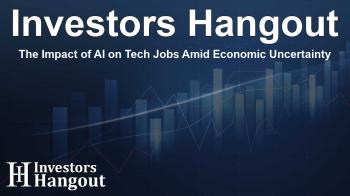The Impact of AI on Tech Jobs Amid Economic Uncertainty

AI's Role in Transforming the Job Market
A recent report from the Bureau of Labor Statistics has revealed a significant reduction in previously reported U.S. jobs, totaling 911,000. This revelation has caused a stir among economists and market analysts, raising concerns about the health of the labor market and the potential need for interest rate cuts by the Federal Reserve.
Understanding the Job Market Adjustments
The unexpected revisions indicate a feeble job market moving into 2025, which may impact market trends and investor confidence. Analysts emphasize that this could lead to a slowdown in the market rally experienced over the previous months.
AI Automating Jobs in the Tech Sector
Report insights from key economists, such as Bill Adams from Comerica Bank, suggest that AI technology is significantly influencing job losses, particularly within the tech sector. The adjustments show that the information industry faced larger job cuts than other sectors.
According to Adams, this impact is a clear indication that jobs related to technology are becoming increasingly automated, leading to a slowdown in what was once a booming industry. The labor market’s overall revision painted a picture of a broader economic slowdown, affecting industries including leisure, hospitality, and retail.
Are Worries of Stagflation Justified?
The recent findings have sparked worries about the possibility of stagflation—an economic condition characterized by slow growth coupled with high inflation. Experts have pointed out that the deteriorating job market may complicate the Federal Reserve’s decisions regarding interest rates.
Market Reactions and Economic Implications
Chris Zaccarelli, Chief Investment Officer for Northlight Asset Management, indicated that while the Fed may consider cutting rates, the current economic conditions might hinder this action amidst inflationary trends. If inflation continues to rise, it may fuel concerns about the economy spiraling into a stagflation scenario.
The Unprecedented BLS Revision
As one of the largest job market adjustments in history, the BLS revision indicates a significant deviation from historical averages, suggesting an urgent need for policy review. Jeffrey Roach, Chief Economist at LPL Financial, remarked that this correction's magnitude highlights how critical the labor market is to understanding economic health.
Political Responses to Economic Trends
In light of these revisions, political figures are also taking notice. Former President Donald Trump criticized the Federal Reserve's actions, arguing that they’re lagging behind market conditions. Trump's remarks reflect broader concerns regarding the leadership's responsiveness to economic challenges.
Current Market Overview and Performance
Despite the turbulent job market picture, major indices such as the SPDR S&P 500 ETF Trust (SPY) and Invesco QQQ Trust ETF (QQQ) have shown resilience in recent trading sessions. These ETFs, which mirror the performance of the S&P 500 and Nasdaq indices respectively, experienced slight increases, showcasing investor attempts to navigate the ongoing volatility.
Investors and market watchers remain cautiously optimistic as they assess how these economic adjustments will influence market dynamics moving forward. The intersection of job automation through AI and the looming threat of stagflation forms a complex backdrop that investors must navigate carefully.
Frequently Asked Questions
What caused the recent drop in reported U.S. jobs?
A recent revision from the Bureau of Labor Statistics corrected the job count, revealing a decrease of 911,000 previously reported jobs, indicating a weaker labor market.
How is AI contributing to job losses?
AI is increasingly automating processes within the tech industry, leading to significant job losses and slowdowns in specific sectors.
What does stagflation mean for the economy?
Stagflation refers to an economic condition of stagnant growth, high unemployment, and inflation, creating challenges for economic policy.
How did the job market revision affect market indices?
While the job market revision sparked concerns, major indices like SPY and QQQ showed some resilience, reflecting ongoing market adjustments.
What are economists predicting for the future job market?
Economists express concerns about potential further job losses and an uncertain economic environment due to inflation and automated job processes.
About The Author
Contact Dominic Sanders privately here. Or send an email with ATTN: Dominic Sanders as the subject to contact@investorshangout.com.
About Investors Hangout
Investors Hangout is a leading online stock forum for financial discussion and learning, offering a wide range of free tools and resources. It draws in traders of all levels, who exchange market knowledge, investigate trading tactics, and keep an eye on industry developments in real time. Featuring financial articles, stock message boards, quotes, charts, company profiles, and live news updates. Through cooperative learning and a wealth of informational resources, it helps users from novices creating their first portfolios to experts honing their techniques. Join Investors Hangout today: https://investorshangout.com/
The content of this article is based on factual, publicly available information and does not represent legal, financial, or investment advice. Investors Hangout does not offer financial advice, and the author is not a licensed financial advisor. Consult a qualified advisor before making any financial or investment decisions based on this article. This article should not be considered advice to purchase, sell, or hold any securities or other investments. If any of the material provided here is inaccurate, please contact us for corrections.

